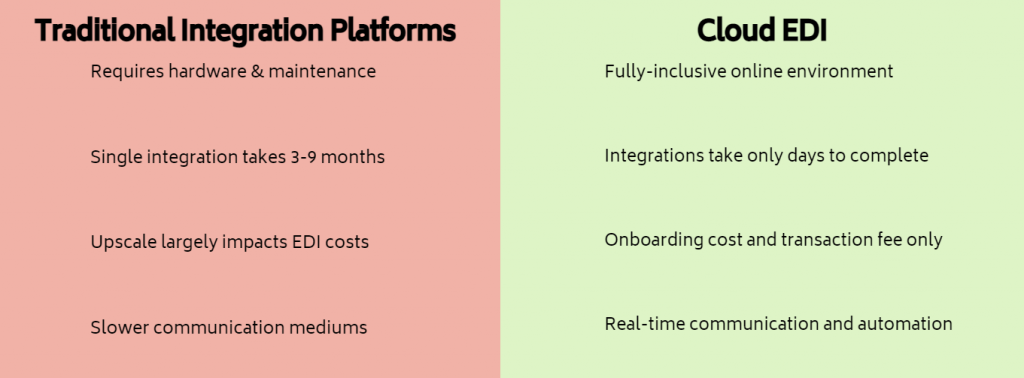
Cloud EDI Software Benefits Every Small Business Should Know in 2025
On January 6, 2023 by Latheefa NazeerWhat is Cloud EDI?
Cloud EDI is a modern, cloud-based approach to electronic data interchange that helps businesses send and receive documents securely over the internet. Unlike traditional EDI systems, which rely on offline workflows and expensive hardware, a cloud EDI platform enables faster, more flexible, and scalable integrations between trading partners.
With a robust cloud EDI solution, companies no longer need to maintain on-premise servers or manually handle every transaction. Instead, data exchange is streamlined, real-time, and highly automated – making cloud EDI software an ideal choice for small to mid-sized businesses looking to modernize their supply chain and B2B operations.
Cloud EDI and APIs
A cloud EDI platform typically works in combination with APIs, offering developers and non-technical teams access to dynamic and scalable EDI integrations. These APIs are far more advanced than traditional EDI systems and allow for rapid setup, validation, and exchange of EDI documents through the cloud.
For example, Zenbridge’s cloud EDI solution includes a powerful Spec Editor, reducing configuration time from days to hours using an interactive interface, without the need to learn legacy EDI coding.
Key Benefits of Using Cloud EDI Software for Your Business

Limitless Environment
A key advantage of any reliable cloud EDI software is its flexibility and scalability. Unlike traditional EDI platforms, which are limited by on-premise environments and hardware dependencies, a cloud-based EDI platform lets you scale integrations, automate data backups, and manage EDI documents without added infrastructure costs.
Faster Integrations
Modern Cloud-based APIs for EDI can deliver real-time responses for everything from specs configuration to production and error correction. Since the majority of the integration process on the API is automated, you save hundreds of manual hours wasted in coding, validations, and communication. Our API takes only days to integrate EDI with any trading partner worldwide. On the other hand, legacy EDI platforms still take 3-9 months to do the same.
Low Maintenance Cost
One of the most important benefits of adopting a cloud EDI solution is the significant reduction in infrastructure and maintenance costs. Many businesses still operate legacy EDI platforms that require in-house teams to manage servers, monitor activity, and maintain hardware. This includes paying expensive EDI specialists, 24/7 support staff, and investing in ongoing system upgrades.
With a cloud-based EDI system, all of this is handled by the platform provider. Zenbridge’s cloud EDI software manages its own infrastructure, including storage and uptime, reducing your overhead to just initial onboarding and a pay-per-transaction model. This makes it a highly cost-effective and scalable EDI solution for small and growing businesses.
Better Communication
Despite the availability of modern communication tools, many businesses using legacy EDI systems still rely on emails and spreadsheets for exchanging critical updates, leading to delays, miscommunication, and inefficiencies.
With Zenbridges’ interfunctional dashboard, communication is centralized and automated, allowing you to engage with your trading partners in real time. This is especially useful for real-time EDI integration, as it eliminates back-and-forth confusion and helps ensure all specifications are aligned before deployment.
Cloud-based systems also enable instant access from anywhere with an internet connection, supporting remote operations and faster decision-making, key aspects of a truly modern EDI integration strategy.
Conclusion
In today’s cloud-first world, businesses need a secure, scalable, and efficient way to manage EDI communications. A cloud EDI platform like Zenbridge not only simplifies EDI workflows but also eliminates the burden of infrastructure maintenance and manual configuration.
Whether you’re a small business or an enterprise, transitioning to a cloud EDI solution is essential to stay competitive in modern B2B commerce.
Explore how Zenbridge’s cloud EDI software can transform your EDI operations – faster onboarding, lower costs, and real-time visibility, all from the cloud.

Leave a Reply